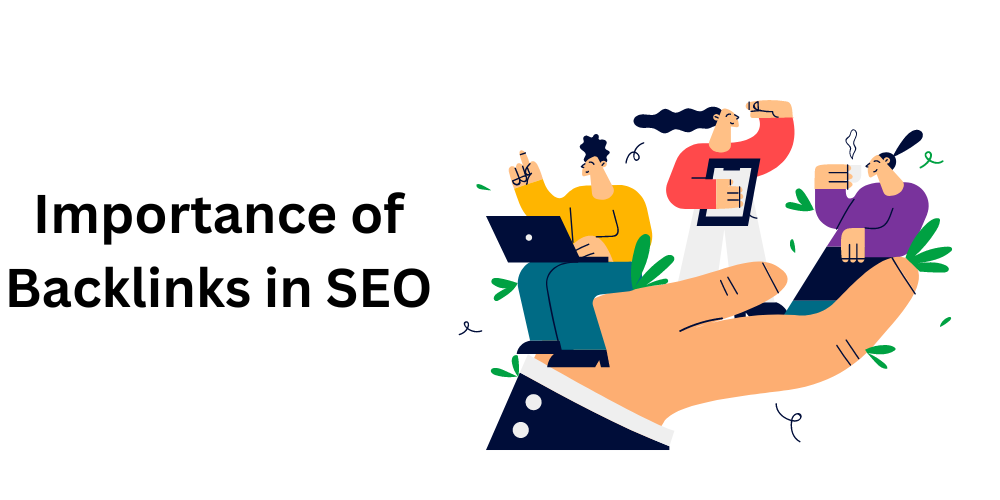Short answer: yes!
How? Why are backlinks important?
Let’s dig in. But first, let’s dispel the rumors about links.
Are Links Necessary for SEO?
Speaking at Pubcon Pro 2023, Gary Illyes [a Google Search Analyst] said you can rank your pages without links.
And I agree. We have a few such pages on our blog. They have zero links and are on page 1 results.

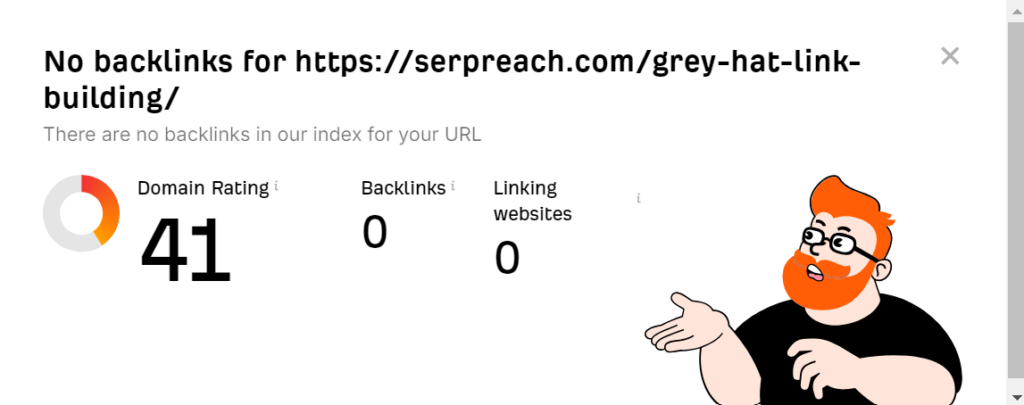
Nevertheless, that statement does not mean backlinks are not essential to SEO. In fact, Gary further said, “Links are not a top 3 ranking signal and haven’t been for a while.”
The interpretation:
Links are still a ranking signal crucial to SEO success. Rumor dispelled!
How Are Backlinks Important To Search Engines?
- Ranking factor
- Trust signal
- Brand exposure
- Relationship-building
- Competitor analysis
- Search engine crawling and indexing
- Website’s domain authority
- Referral traffic
- Website growth
- First-page results
Ranking Factor
Backlinks influence search engines’ ranking algorithms. How?
When you get your backlinks from high-quality websites, search engines get a signal that your content is valuable and trustworthy.
In other words, acquiring backlinks (both in quality and quantity) works in 3 ways:
- First, it serves as a vote of confidence for your content
- A proof of authority for your page
- As a result of the first two points, your search engine ranking gets a boost.
Furthermore, search engines like Google measure these votes to determine how your page should rank in online searches.
Bottom line:
The more backlinks you gain, the higher your chances of being ranked over your competitors since each relevant backlink you earn increases the prominence of your page.
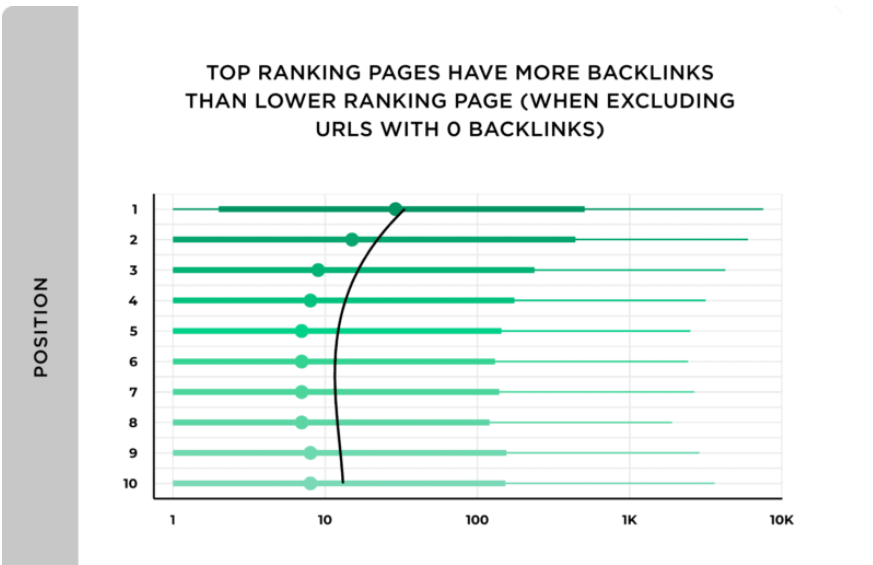
Trust Signal
More than backlinks being a ranking factor, they also increase the trustworthiness of your content and webpage, especially if the backlinks are from authoritative websites.
Particularly, backlinks continue to be a relevant search engine & optimization tool because search engines see backlinks, which are outbound links to your page, as an essential trust signal.
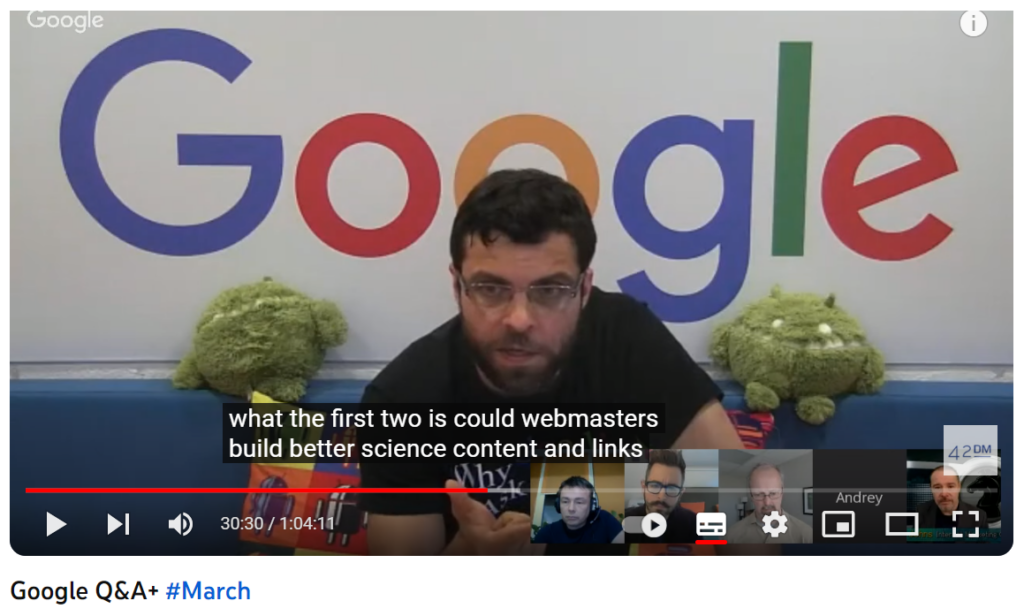
For instance, when websites with high authority link to your page through backlinks, Google sees your website as trustworthy because high-quality websites are pointing to it.
Additionally, even visitors to your page see backlinks from authority websites as a trust signal. For example, imagine Forbes linking to your page. You will naturally gain your page visitors’ trust.
Overall, search engines and people have confidence in a website with many quality backlinks, showing them that the webpage deserves to be ranked at the top.
Brand Exposure
Let’s say a high-traffic website links to your page; your page will naturally be seen by many of its audience. As a result, since these people trust the website, there is a high guarantee that they will click on your website link -this is what gaining backlinks does for you.

Basically, backlinks make it easier for your brand or website to be found online by both search engines and people by improving your visibility and exposing you to a broad audience.
Even if all of their audience will not click on your website, there is still plenty to gain. The more backlinks you get, the more exposure you get for your brand as people click on your website link.
Relationship Building
With backlinks, you connect with the website you are linking with, creating a sense of online community.
When you contact high-quality websites in your niche or influencers, you build a genuine relationship with them, which could go beyond the online space.
Also, due to this relationship, they can vouch for your content. Therefore, they can naturally mention your brand or website link without you buying links from them.
Furthermore, these relationships can create opportunities like partnerships or collaborations for you in the future.
Competitor Analysis
After acquiring backlinks from high-authority websites, it is only wise to run a backlink report. Why?
- You will not only get insight into all the links you’ve acquired, but
- You will also access the websites linking to your competitors’ pages.
Ultimately, you will know the websites you should earn links from to beat your competitors.
Also, by discovering new linking opportunities, you can build a more effective link-building strategy to rank higher than your competitors and drive more traffic to your website.
Search Engine Crawling and Indexing
Like humans, search engines also navigate the internet by crawling from web to web.
A search engine must first find a page before it can display it in its results, and the simplest way to do so is through a link.
Basically, search engines discover new content by revisiting the popular pages they have already scrawled. Then, they follow the links on these popular pages and index the content.

In essence, you are making it easy for search engine crawlers to navigate from one page to another by having backlinks pointing to your backlinks from other pages on your website.
Therefore, by getting quality backlinks from reputable websites, search engines can see your website link quickly and comprehend how the various pages relate to your page.
Website Domain Authority
Google and other search engines view your website as more relevant and authoritative the more backlinks it receives from different domains or content.
Ultimately, backlinks contribute to the overall domain authority of your website, and your chances of ranking highly on search engine results pages increase.
Think of it this way: Google and other search engines evaluate backlinks to your content as proof of its accuracy and authority. The better the source, the higher they perceive your site. Hence, increase website domain authority.
Referral Traffic
You gain direct referral traffic to your website when you acquire quality backlinks. And so?
Referral backlinks direct users from other websites to your page. Here’s how:
Reputable websites that link to your website show their readers that it is an essential source of information. Interested users can then click on your backlink, directing them to your site.
As a result, there is an increase in organic search engine traffic, and your chances of drawing in relevant visitors who are more likely to become leads or customers increase depending on the number of high-quality backlinks you have.
Website Growth
SEO backlinks help websites grow in various ways. Once established, a backlink continues to provide traffic and SEO benefits in the long run.
Notably, consistently investing in high-quality backlinks lays the groundwork for long-term organic development and increased website traffic.
Therefore, earning quality backlinks can help you enhance your search visibility, drive more people to your website, and ultimately boost your revenue.
Furthermore, strategic link building will create a means for your target audience and new ones to interact with your website, brand, or services.
In essence, as your website’s search engine rankings rise, it is more likely to be noticed by a larger audience.
First-Page Results
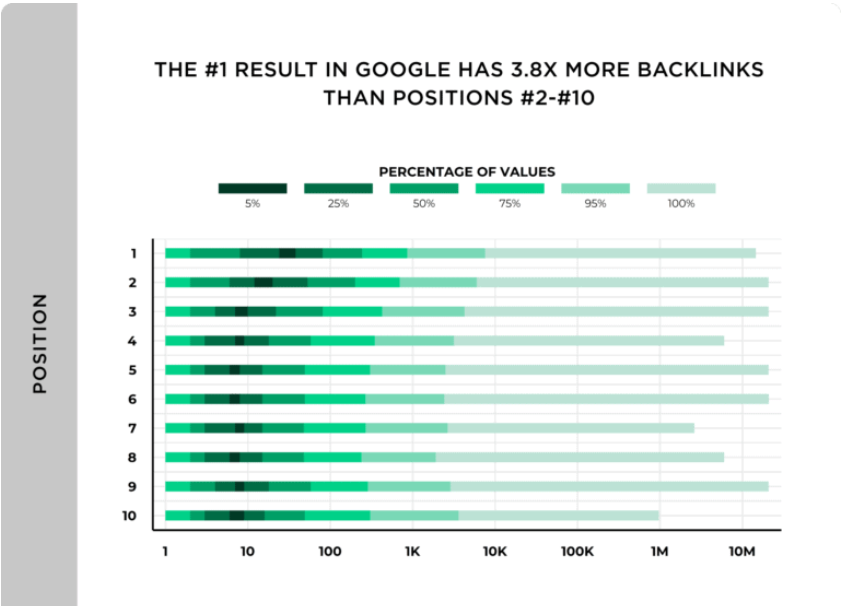
If you want to rank on the first page of SERPs, you need backlinks. What backlinks do is give your page a good chance of ranking at the top of search engine result pages.
Let me break this down:
- Gaining quality backlinks will contribute to your page’s authority and trustworthiness.
- The more backlinks you gain, the better.
- Finally, this will expose your page to search engines and ultimately influence their decision to rank it at the top.
Bottom line:
When search engines discover a link to your page on another high-quality website, they consider it a recommendation. Combined with great content, your page can rank on the first page of Google.
Quick note: Not all backlinks carry the same weight for SEO. Some (low-quality, spammy) links won’t do anything for your goals.
Only high-quality backlinks are crucial (and work) for your SEO campaigns.
What Makes A Good Backlink?
- Topical Relevance
- Trusted source
- Keyword in anchors
- Dofollow Links
- Unique referring domains
Topical Relevance
In my opinion, relevance is the first and most crucial factor separating a low-quality link from a high-quality alternative.
And you can ascertain this (topical relevance) with a few questions:
- Is your referring page or domain related to your website?
- Do you sell or discuss similar topics? Is the niche related?
For example, say you are a SaaS brand whose ICP (Ideal Customer Profile) is home buyers. Is a cannabis-selling website related to you?
No. Why?
There are no topic overlaps and no relationship whatsoever.
In this case, it doesn’t matter if the DA (Domain Authority) of the referring domain (the cannabis website) is 90. The link won’t be high-quality.
Trusted Source
Getting a backlink from a topically-relevant referring domain is “good.” But it is only the standard base for any successful SEO campaign.
You need more. What more?
Let’s use a building perspective…
Think of link campaigns as building a house. You “must” set a strong foundation. However, you still need bricks to structure the house as intended.
Now, one of the ingredients of the brick is authority. And the more authority, the better the building.
Back to link building…
Authoritative sites that are also topically relevant offer the most link equity. Your site can leverage such for growth.
Note:
Authority is not just about DA scores. It also includes brand exposure, traffic, and traffic potential.
Keyword In Anchors
Anchors describe what a backlink is to search engines and readers. And it only makes sense that they contain your money keywords.
However, adding target keywords to anchors can be tricky. How so?
- Ideally, keyword-rich anchors can help your SEO efforts
- But over-using them can be tagged as spammy link building
- Worse case: there is no standard ratio on how to use anchors.
So, how do you navigate this problem?
To ensure your backlink is keyword-optimized, target a variation of anchors. Don’t go so hard on “exact match” terms. Use partial match keywords too.
Further reading: What Anchor Types Are Good for SEO?
Dofollow Links
The idea of link building is to leverage the link juice from referring domains/pages to your site. In turn, the authority will boost your rankings on search engine results.
Unfortunately, not all links contain the “juice.” We call these backlinks “nofollow links.”
The belief in the SEO world is that nofollow links don’t contribute to search ranking. And that they are “useless.”
In other words, quality incoming links are not “nofollow backlinks.” Instead, they are dofollows (the ones with link juice).
📌 Are Nofollow Links High-Quality Backlinks?
In contrast to what SEOs say about nofollow links, they are not all doom.
For example, you can still leverage the referring traffic and brand exposure from a nofollow link. While that might not increase your ranking, it will boost sales (the end goal of all marketing).
Unique Referring Domains
Having relevant, dofollow, and authority backlinks is not enough. What about the referring domains?
Are you getting all your backlinks from a single domain or several?
Regardless of the authority of a page, the more backlinks you get from it (the page), the lesser the impact of its link juice.
In contrast, the more backlinks you get from unique referring domains, the more link juice you’ll accumulate to rank your pages. This is why top-ranking pages have more referring domains than other pages.
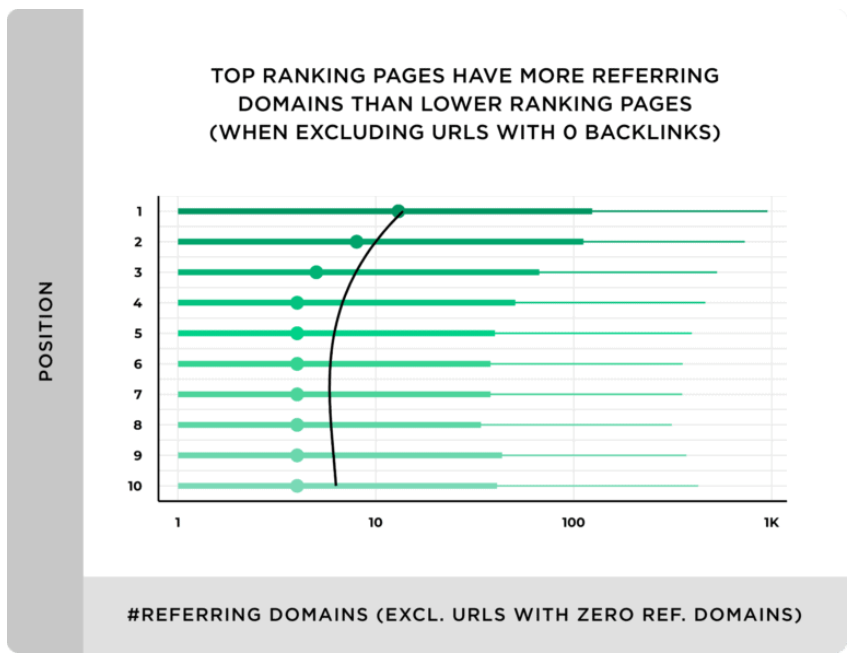
📌 Here’s another way to look at the need for referring domains:
Getting all your backlinks from a single authority domain is like getting 100 5-star reviews from a single customer. Now, compare that with 5-star reviews from 100 customers.
Which one of the two is better?
Obviously, the reviews from 100 customers; the same principles apply if you want quality backlinks.
How to Create High-Quality Backlinks
- Guest posting
- Blogging
- PR link building
- Broken link building
- Competitor analysis
Guest Posting
Guest posting is one of the OG link building techniques. And to date, it is just as effective.
According to both “State of Backlinks” and “State of Link Building” in 2022, guest posting is a top-3 link building strategy. And to appreciate the conclusion, these reports are carried out differently with diverse focus groups.


But, like all popular tools/techniques, guest posting is often abused to the point of being spammy. Hence, the reason you should learn how to do “high-quality guest posting.” below are some ways you can get started:
- Parasite SEO
- Posting on niche-relevant, authority sites
- Join podcasts
Parasite SEO
Parasite SEO has been going on for years. It has only become so famous in recent years. And the way it works is simple:
You (the parasite) will feed off the authority of an external site (the host) to rank your post. This is what Julian Goldie does. How?
- He writes around both low-competition and high-competition keywords.
- Then, he publishes the post on LinkedIn.
Here is an example:
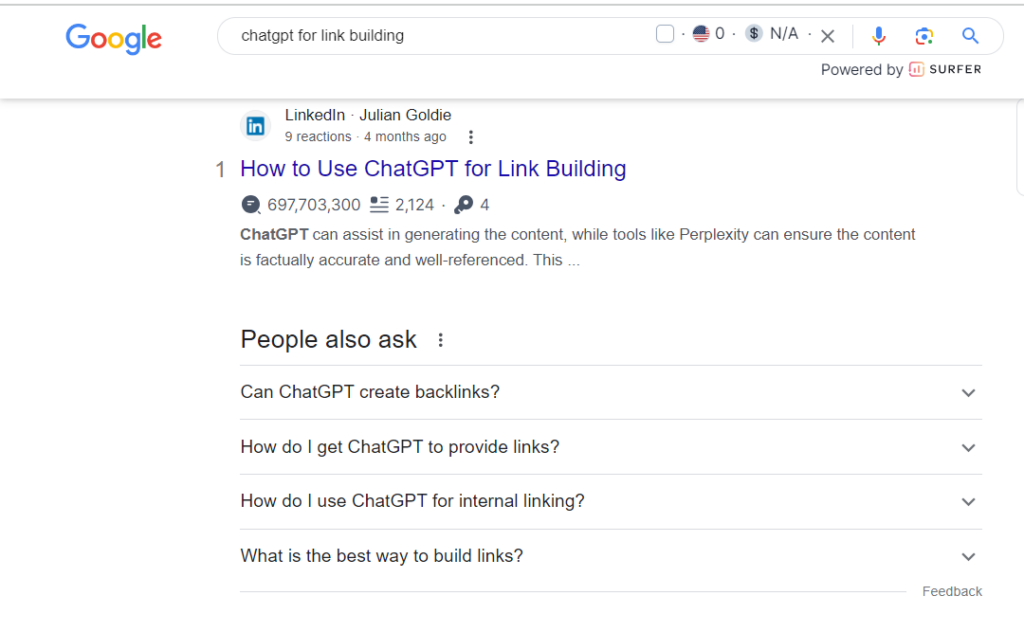
Mind you: Julian’s blog post is outranking high-authority sites like Search Engine Land.
At the basics, this technique is classic guest posting. But it works so well that it has a unique name.
Pro tip:
Use parasite SEO directly for affiliate marketing or homepage/service page links.
Posting on Niche-Relevant, Authority Sites
This technique is unlike parasite SEO, where you publish your content on “generalist” sites. Here, you will curate sites that discuss the same topic (or related topics) as yours. Then, pitch for a guest post.
Here is a more detailed description of how this technique works:
- Use Content Explorer to check sites with similar interests
Pro tip: use the “use cases” for “guest blogging opportunities.”
- Check specifically for sites with high authors.
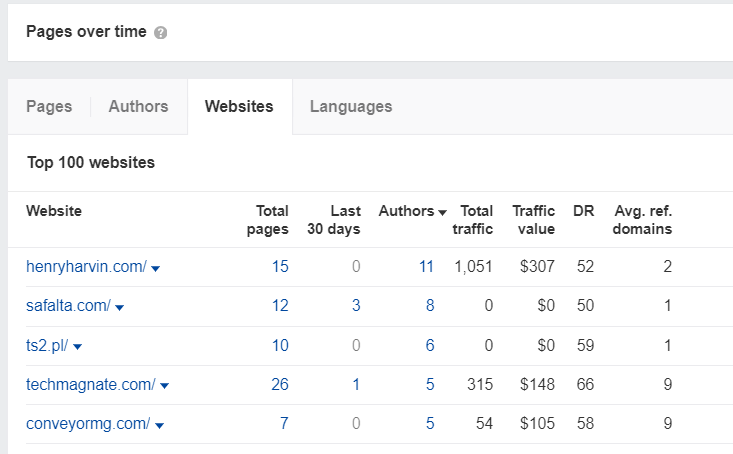
- Such sites will likely be open to guest submissions. Send your pitch.
Join Podcasts
Podcasts (webinars) are one of the raves in digital marketing now. And fortunately, they can be exploited for backlinks. How?
This works exactly like guest posting.
- First, find channels that talk about your topics. For example, here is Julian Goldie in an SEO podcast talking about AI.

- Pitch to get in
- Offer value and links to your money pages will be shared live
- And if you have some courses, you might make some money on that too, live
- Lastly, you’ll get a brand mention for podcast owners who summarize their events into blog posts.
Blogging
This technique works precisely like guest posting. The only difference is that you’re building the asset on your site rather than others’ websites.
And here’s the exciting part:
Unlike guest posting, blogging can fetch you editorial links. These backlinks are earned from top-quality linkable assets.
So, how can you create these linkable assets?
You need to follow three steps:
- Keyword research
- On-page optimization
- Targeted outreach
Keyword Research
If you’re starting out, I recommend targeting low-competition keywords.
In other words, find terms with low keyword difficulty scores.
Note:
Low scores do not necessarily mean easy. It is more of the number of backlinks/referring needed to rank for such keywords.
That said, head to Keyword Explorer > Type in your seed term > Look at the related matches and questions for low-difficulty options.
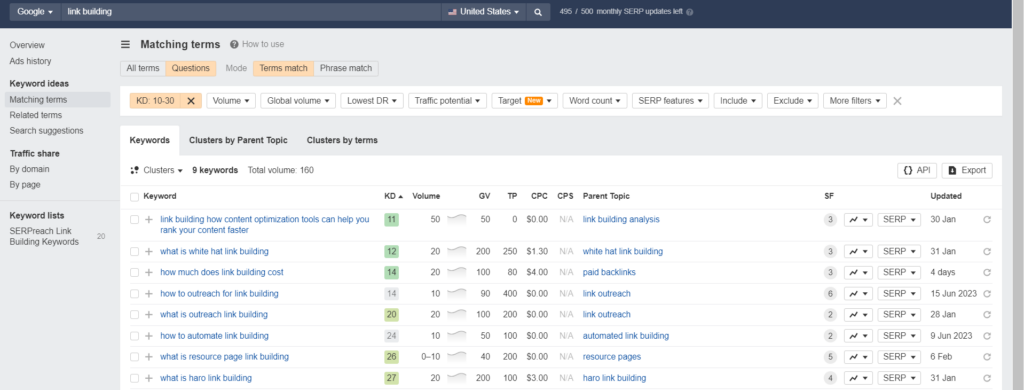
Also, check the search intent of the keywords. This will guide you on what to write and the structure/style to adopt.
On-page Optimization
Ideally, I recommend including keywords in strategic places. But that advice can be too rigid. So, do this instead:
- Get an on-page optimization tool like Surfer or ClearScope
- Aim for at least scores 70-75
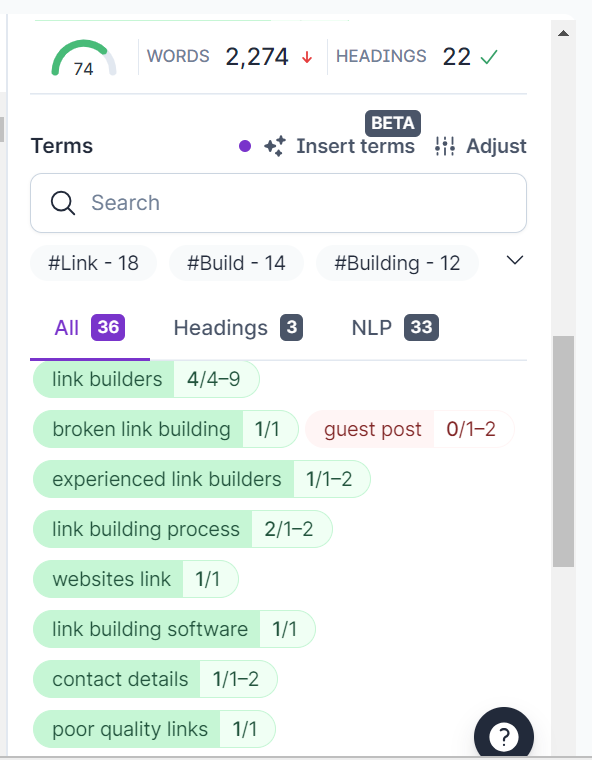
Note: only add the suggested terms when they fit naturally into your content.
Targeted Outreach
While you can leave your content to gain backlinks without outreach, the process takes time. Hence, the reason for “targeted outreach.”
And the beauty of targeted outreach is that it targets pages already linked to similar articles (but not as good as yours).
PR Link Building
PR (Press Release) is a way to build higher-quality editorial backlinks. Unlike in blogging, you don’t necessarily need to write a post. How so?
PR links are more about what you do than what you write. For example, you will hardly get a PR backlink for creating a linkable asset. On the other hand, you’ll get a link from a media site for sponsoring a local event.
So, what are some of the assured ways of building PR backlinks?
- Use HARO
- Follow your favorite journalists on social media
Use HARO
HARO (Help a Reporter Out) is a resourceful tool for PR links. It connects journalists to sources for their news.
In essence, you’ll get a backlink for providing answers and expert opinions to queries.
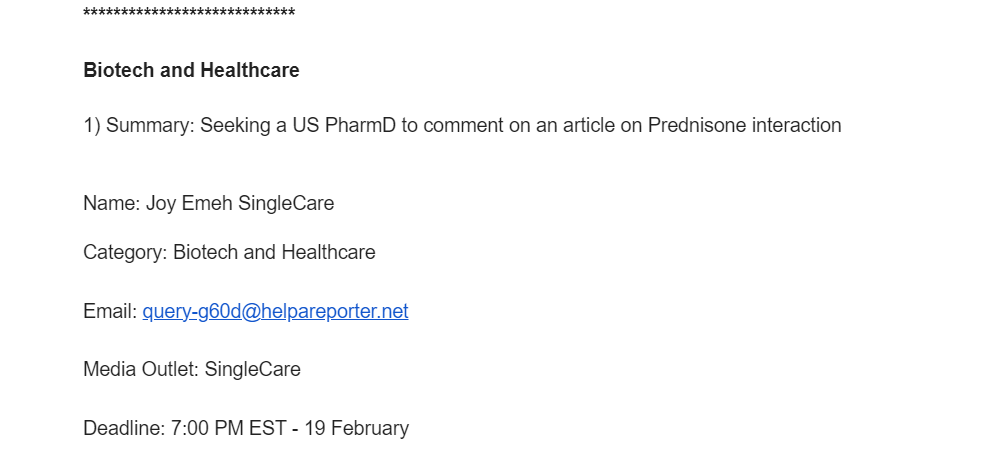
The only concern with HARO is the competition. In that case, you can try alternatives like Help a B2B Writer or Terkel.

Follow Your Favorite Journalists on Social Media
If HARO (or its alternatives) is not getting you the desired results, you can always go the manual route. Find the journalists you’d like to pitch on social media, follow them, and engage with their posts to build a relationship. Then, you can pitch your expert opinions.
Additionally, you can use hashtags like #bloggerrequest, #prrequest, or #journorequest on X (formerly Twitter) to round up journalist requests.

Further reading: How to Build PR Links
Broken Link Building
This technique works so well because it prioritizes the needs of the referring domain/page. How so?
- A broken page is terrible for user experience — especially when it opens to a statistics page.
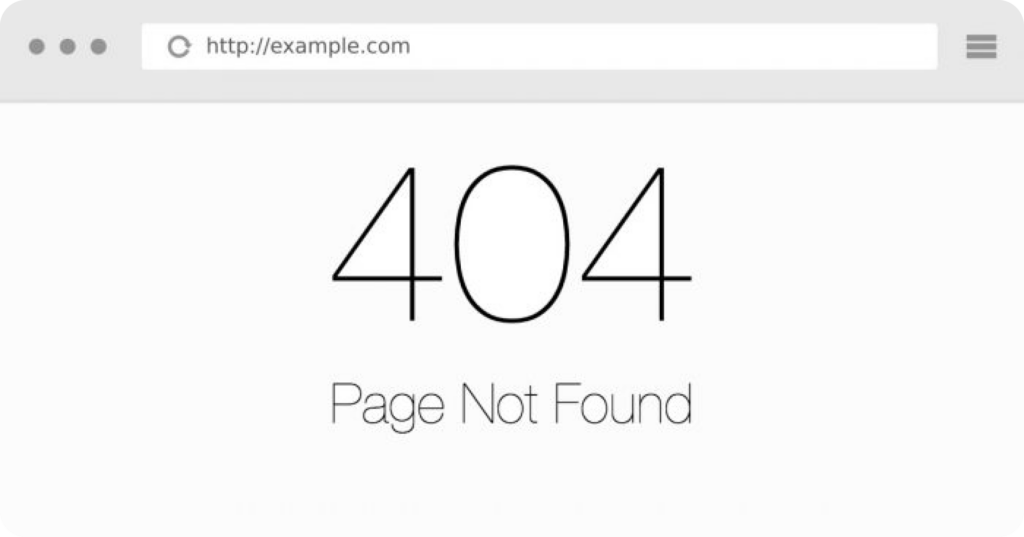
- The referring page/domain owner might not know about the dead page.
- By offering to help, you’ll build a relationship with the site owner. More importantly, you’ll get a backlink for your efforts.
That said, how can you do broken link building (BLB)?
I have already compiled a resource guide on BLB. Check it out!
Competitor Analysis
The ultimate strategy for building high-quality links is to study how your competitors get theirs. To get to the root of it, ask these questions:
- What referring pages and domains are pointing links to your competing domains?
- Is there any correlation or overlap in these referring pages?
- For example, are there any link intersections?

- Can you also get links from the “intersections”?
Once the question stage is finalized, you can start your competitor analysis appropriately. Follow the guide below for the “how”:
How to Find Backlinks of Competitors
Search Engine Optimization Is Not a Number Game
More backlinks and referring domains are undoubtedly excellent for successful link building campaigns. However, understand that quantity is nothing without quality.
For example, look at this screenshot of the top-ranking web pages for “link building”:

Despite having fewer backlinks and referring domains, Yoast ranks higher than Moz. And they both have the same DR (domain ratings).
📌 What could be the reason?
Backlinks are only one part of the equation. There are several other signals that search engines monitor to rank web pages.
In summary, build quality backlinks, ensure your content is appropriately formatted, and that other elements on your website are optimized for SEO. That’s how to win.
Verdict
To answer the question, yes. Backlinks are crucial to SEO. They are ranking signals and ultimately boost website growth.
However, note that all backlinks have the same impact. Only the high-quality types move the needle. So, focus on building such; use the techniques discussed in this article.
